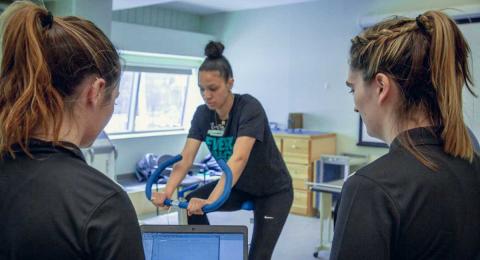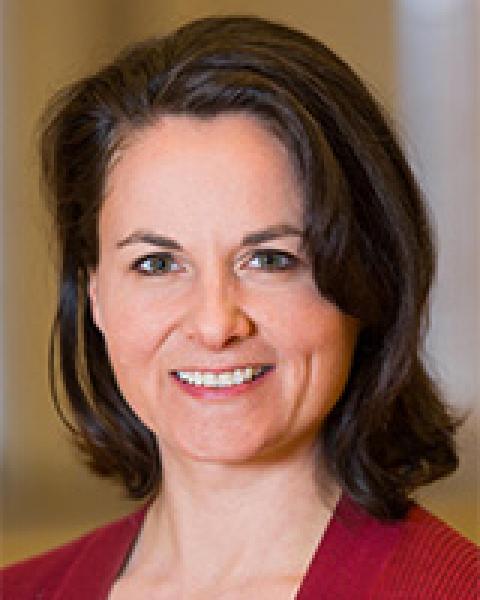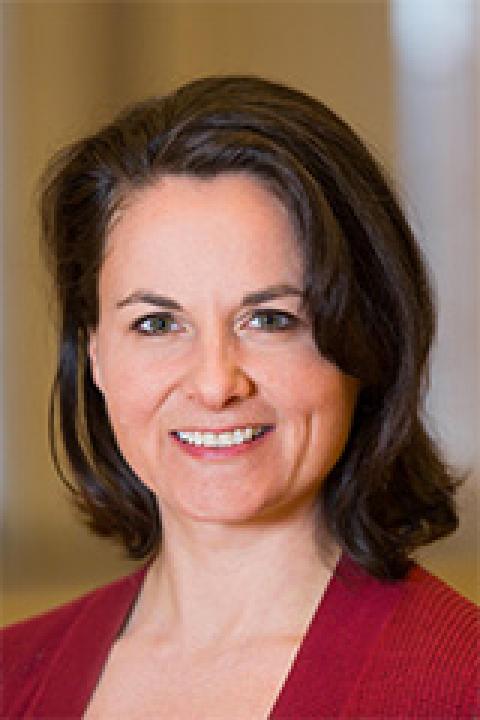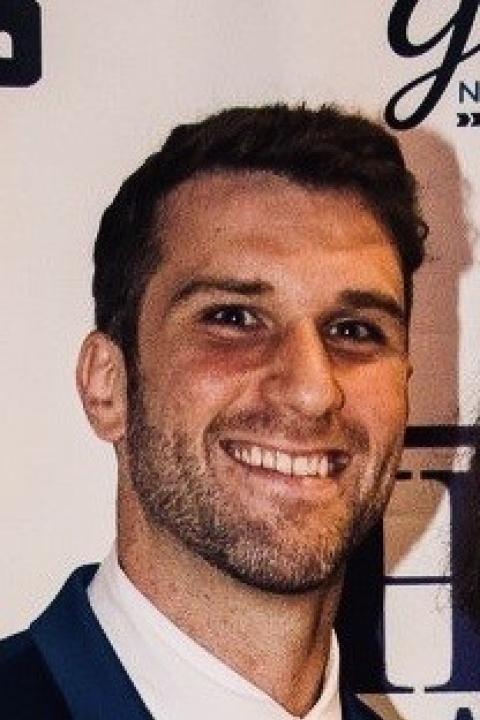Pushing the Limits of Human Performance
How does the human body respond to exercise? What are the limits of human performance? How can exercise training impact chronic disease, quality of life, and sport success?
These are some of the questions the study of exercise and sport physiology investigates. Exercise physiology is the study of the acute and chronic adaptations to the stress of physical activity. While the study of exercise physiology can inform us how exercise can improve physiological function in general; its sub-discipline, sport physiology, helps us understand and improve athletic performance specifically.
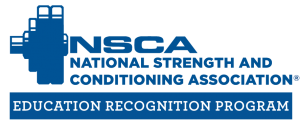
 PSU’s Exercise & Sport Physiology program is a National Strength and Conditioning (NSCA) Education Recognition Program (ERP). The NSCA-ERP designation recognizes schools with standardized, approved strength and conditioning curricula designed to help students prepare for top certifications in the field.
PSU’s Exercise & Sport Physiology program is a National Strength and Conditioning (NSCA) Education Recognition Program (ERP). The NSCA-ERP designation recognizes schools with standardized, approved strength and conditioning curricula designed to help students prepare for top certifications in the field.
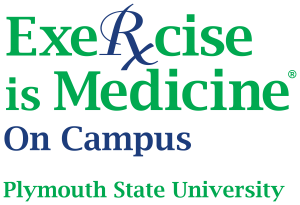
The Exercise & Sport Physiology program helped establish PSU as a member of the American College of Sports Medicine’s (ACSM) Exercise is Medicine On Campus (EIM-OC) program. The mission of the EIM-OC initiative is to connect campus and community to support the ‘Exercise is Medicine’ vision: to encourage the use of physical activity in the prevention and treatment of chronic diseases.
This major provides a strong science-based curriculum of advanced courses in exercise physiology, exercise testing and prescription, strength and conditioning, and research methodology with an emphasis on the improvement and understanding of human performance. Laboratory activities, research, and clinical applications are components of this program. Majors will be prepared for careers in clinical research settings, strength and conditioning, and the health/fitness industry. The major also provides a strong foundation for future graduate studies in Exercise Science, Physical Therapy, Occupational Therapy, and other allied health related fields. In addition, the program prepares students to challenge select certification examinations such as the American College of Sports Medicine’s Certified Exercise Physiologist (EP-C) and the National Strength and Conditioning Association’s Certified Strength and Conditioning Specialist (CSCS).
Students interested in graduate study in exercise science who have completed all prerequisite courses at the end of the 3rd year of study can apply to the MS degree program for their 4th year of study. Students who complete all requirements will earn the BS in Exercise & Sport Physiology at the completion of their 4th year and the MS in Exercise Science & Sport Performance at the completion of their 5th year.
Students interested in a career in physical therapy must apply to the 3+3 DPT option at the time of application to PSU. Students entering this option must meet the minimum admissions requirements, including a minimum high school GPA of 3.5, at least 3 years of math, and at least 3 years of science. A limited number of admissions spots are available. If accepted into the 3+3 DPT option, students will have the opportunity to complete a bachelor’s and Doctor of Physical Therapy degree in 6 years. During the first 3 years, students must meet the following requirements to begin the DPT program year 4:
- Letter of intent at end of sophomore year (to confirm intent to pursue the DPT)
- Observation hours in Panther Pro-Bono Clinic: > 25 hours (via AHS 2200)
- Minimum grade of B- in all DPT pre-requisite courses
- Overall GPA: > 3.5
- Science GPA: > 3.3
- Completed PTCAS application
Curriculum & Requirements
Exercise & Sport Physiology
| Course | Title | Credits |
|---|---|---|
| Major Requirements | ||
| EX 2755 | Introduction to Exercise Science | 3 |
| EX 3580 | Physiology of Exercise | 3 |
| EX 3750 | Physiology of Exercise Laboratory | 1 |
| EX 3860 | Exercise Testing and Prescription | 3 |
| EX 3865 | Exercise Testing and Prescription Laboratory | 1 |
| EX 4520 | Principles and Theories of Strength and Conditioning | 3 |
| EX 4770 | Exercise Physiology for Special Populations (WRCO) | 3 |
| BI 2110 & BI 2130 | Human Anatomy and Physiology I and Human Anatomy and Physiology Laboratory I | 4 |
| BI 2120 & BI 2140 | Human Anatomy and Physiology II and Human Anatomy and Physiology Laboratory II | 4 |
| CH 2335 | General Chemistry I (QRCO) | 4 |
| CH 2340 | General Chemistry II | 4 |
| HE 3220 | Applied Nutrition for Healthy Living (TECO) | 3 |
| MA 2300 | Statistics I (QRCO) | 3 |
| PE 3570 | Kinesiology | 3 |
| PE 3720 | Motor Learning | 3 |
| General Education | ||
| EN 1400 | Composition | 4 |
| IS 1115 | Tackling a Wicked Problem | 4 |
| CTDI | Creative Thought Direction | 3-4 |
| PPDI | Past and Present Direction | 3-4 |
| SSDI | Self and Society Direction | 3-4 |
| Directions (choose from CTDI, PPDI, SIDI, SSDI) 1 | 4-7 | |
| DICO | Diversity Connection | 3-4 |
| GACO | Global Awareness Connection | 3-4 |
| WECO | Wellness Connection | 3-4 |
| IS 4220 | Signature Project (INCO,INCP) | 4 |
| Option Requirements | ||
| Complete one from the following required options | 27.5-33.5 | |
| BS in Exercise & Sport Physiology | ||
| 3+2 BS in EX, MS in Exercise Science and Sport Performance | ||
| 3+3 BS in EX, Doctor of Physical Therapy Option | ||
| Total Credits | 120 | |
- 1
- Directions must total a minimum of 16 credits.
BS in Exercise & Sport Physiology Option
| Course | Title | Credits |
|---|---|---|
| HE 2500 | First Aid and CPR/AED | 1.5 |
| EX 4525 | Principles and Theories of Strength and Conditioning Laboratory | 1 |
| EX 4820 | Advanced Exercise Physiology | 3 |
| EX 4825 | Advanced Exercise Physiology Laboratory | 1 |
| EX 4840 | Research Methods in Exercise Science (WRCO) | 3 |
| Professional Skills - Complete two: | 3 | |
PE 2428 | Flexibility, Core, and Balance Training | |
PE 2640 | Burdenko Conditioning | |
PE 2831 | Resistance Training Techniques | |
| Psychology Choice - Complete one: | 3-4 | |
PBH 3210 | Social and Behavioral Health Psychology | |
CC 3860 | Psychological Aspects of Sports | |
| Capstone Experience - Complete one: | ||
| EX 4830 | Applied Research in Exercise Science | 4-12 |
| or EX 4880 | Exercise & Sport Physiology Internship | |
| Electives | 19.5-21.5 | |
| Total Credits | 39-50 | |
3+2 BS in EX, MS in Exercise Science & Sport Performance Option
| Course | Title | Credits |
|---|---|---|
| 3+2 MS in Exercise Science & Sport Performance Requirements | ||
| EX 5210 | Advanced Exercise Physiology | 3 |
| EX 5220 | Advanced Exercise Physiology Laboratory | 1 |
| EX 5310 | Research Methods in Exercise Science | 3 |
| EX 5410 | Applied Research in Exercise Science | 4 |
| EX 5510 | Graduate Seminar in Exercise Science | 1 |
| EX 5520 | Advanced Exercise Testing & ECG | 4 |
| EX 5610 | Advanced Strength and Conditioning | 4 |
| EX 5710 | Advanced Practicum in Exercise Science | 3 |
| EX 4525 | Principles and Theories of Strength and Conditioning Laboratory | 1 |
| HE 2500 | First Aid and CPR/AED | 1.5 |
Psychology Choice - Complete one: | ||
| PBH 3210 | Social and Behavioral Health Psychology | 4 |
| CC 3860 | Psychological Aspects of Sports | 3 |
Professional Skills - Complete two: | ||
| PE 2428 | Flexibility, Core, and Balance Training | 1.5 |
| PE 2640 | Burdenko Conditioning | 1.5 |
| PE 2831 | Resistance Training Techniques | 1.5 |
| Electives | 4.5-6.5 | |
| Total Credits | ||
| MS in Exercise Science & Sport Performance (final year) | ||
| EX 5620 | Behavioral Intervention Strategies | 4 |
| EX 5730 | Advanced Topics in Exercise Physiology | 4 |
| EX 5840 | Exercise Biochemistry & Sports Nutrition | 4 |
| EX 5920 | Exercise Physiology in Clinical Populations | 4 |
| EX 6100 | Graduate Internship in Exercise Science | 3-6 |
| EX 6200 | Graduate Thesis in Exercise Science | 3-6 |
| Total Credits | 63.5-71.5 | |
3+3 BS in EX, Doctor of Physical Therapy Option
| Course | Title | Credits |
|---|---|---|
| 3+3 DPT Option Requirements | ||
| AHS 2200 | Pre-Professional Observation Experience | 1-2 |
| AHS 3305 | Epidemiology and Evidence Based Medicine (GACO,QRCO,WRCO) | 4 |
| PH 2110 | College Physics I | 4 |
| PH 2120 | College Physics II | 4 |
| Social/Behavioral Science elective | 3-4 | |
To satisfy the social/behavioral science elective requirement, take any 3-4 credit course within the following disciplines at the 3000 or 4000 level: PS, SO, PBH, SE | ||
| Upper Level EX Choice - Complete one: | 3 | |
EX 4520 | Principles and Theories of Strength and Conditioning | |
EX 4770 | Exercise Physiology for Special Populations (WRCO) | |
| Total Credits | ||
| DPT Year 1 (Summer and Fall semesters) 2 | ||
| PTH 6110 | Clinical & Functional Anatomy | 4 |
| PTH 6111 | Clinical Physiology | 3 |
| PTH 6112 | Ethics and Value Systems | 2 |
| PTH 6115 | Patient/Client Management I | 2 |
| PTH 6116 | Integrated Clinical I | 1 |
| PTH 6120 | Neuroscience | 4 |
| PTH 6121 | Musculoskeletal Conditions & Management | 3 |
| PTH 6122 | Dynamic Systems I: Movement & Adaptation | 3 |
| PTH 6124 | Clinical Inquiry I: Causality and Inference | 3 |
| PTH 6125 | Patient/Client Management II | 4 |
| PTH 6127 | Integrated Clinical II | 1 |
| Total Credits | 49-51 | |
- 2
Students who wish to matriculate early into the DPT program, consistent with the 3+3 EX to DPT framework, must earn a minimum grade of B- in all pre-requisite courses (BI 2110, BI 2130, BI 2120, BI 2140, CH 2335, CH 2340, PH 2110, PH 2120, MA 2300, PE 3720, EX 3580, EX 3860, social / behavioral science elective), earn a minimum science GPA of 3.3 (BI 2110, BI 2130, BI 2120, BI 2140, CH 2335, CH 2340, PH 2110, PH 2120, PE 3570, EX 3580), and a minimum overall GPA of 3.5, and complete the PTCAS application requirements during fall of year 3 in the EX program.
Check all course descriptions for prerequisites before planning course schedule. Course sequence is suggested but not required.
To complete the bachelor’s degree in 4 years, you must successfully complete a minimum of 15 credits each semester or have a plan to make up credits over the course of the 4 years. For example, if you take 14 credits one semester, you need to take 16 credits in another semester. Credits completed must count toward your program requirements (major, option, minor, certificate, general education or free electives).
BS Option
| Year One | ||
|---|---|---|
| Fall | Credits | |
| EX 2755 | Introduction to Exercise Science | 3 |
| IS 1115 | Tackling a Wicked Problem | 4 |
| EN 1400 | Composition | 4 |
| BI 2110 & BI 2130 |
Human Anatomy and Physiology I and Human Anatomy and Physiology Laboratory I |
4 |
| Credits | 15 | |
| Spring | ||
| Professional Skills Course | 1.5 | |
| MA 2300 | Statistics I (QRCO) | 3 |
| BI 2120 & BI 2140 |
Human Anatomy and Physiology II and Human Anatomy and Physiology Laboratory II |
4 |
| SSDI | Self and Society Direction | 3-4 |
| PPDI | Past and Present Direction | 3-4 |
| Credits | 14.5-16.5 | |
| Year Two | ||
| Fall | ||
| PE 3570 | Kinesiology | 3 |
| CH 2335 | General Chemistry I (QRCO) | 4 |
| CTDI | Creative Thought Direction | 3-4 |
| Directions (choose from CTDI, PPDI, SSDI) | 3-4 | |
| Professional Skills Course | 1.5 | |
| Credits | 14.5-16.5 | |
| Spring | ||
| EX 3580 | Physiology of Exercise | 3 |
| EX 3750 | Physiology of Exercise Laboratory | 1 |
| CH 2340 | General Chemistry II | 4 |
| HE 2500 | First Aid and CPR/AED | 1.5 |
| Directions (choose from CTDI, PPDI, SSDI) | 0-4 | |
| WECO | Wellness Connection | 3-4 |
| Credits | 12.5-17.5 | |
| Year Three | ||
| Fall | ||
| PE 3720 | Motor Learning | 3 |
| EX 3860 | Exercise Testing and Prescription | 3 |
| EX 3865 | Exercise Testing and Prescription Laboratory | 1 |
| DICO | Diversity Connection | 3-4 |
| Directions (choose from CTDI, PPDI, SSDI) | 0-4 | |
| HE 3220 | Applied Nutrition for Healthy Living (TECO) | 3 |
| Credits | 13-18 | |
| Spring | ||
| EX 4520 | Principles and Theories of Strength and Conditioning | 3 |
| EX 4525 | Principles and Theories of Strength and Conditioning Laboratory | 1 |
| EX 4770 | Exercise Physiology for Special Populations (WRCO) | 3 |
| CC 3860 or PBH 3210 |
Psychological Aspects of Sports or Social and Behavioral Health Psychology |
3-4 |
| GACO | Global Awareness Connection | 3-4 |
| Credits | 13-15 | |
| Year Four | ||
| Fall | ||
| EX 4820 | Advanced Exercise Physiology | 3 |
| EX 4825 | Advanced Exercise Physiology Laboratory | 1 |
| EX 4840 | Research Methods in Exercise Science (WRCO) | 3 |
| Electives | 6-8 | |
| INCO | Integration Connection | 3-4 |
| Credits | 16-19 | |
| Spring | ||
| EX 4830 or EX 4880 |
Applied Research in Exercise Science or Exercise & Sport Physiology Internship |
4 |
| Electives | 9-12 | |
| Credits | 13-16 | |
| Total Credits | 120 | |
- 1
Directions should total 16-17 credits because SIDI is waived for BS Exercise and Sport Physiology.
3+2 Option
| Year One | ||
|---|---|---|
| Fall | Credits | |
| EX 2755 | Introduction to Exercise Science | 3 |
| IS 1115 | Tackling a Wicked Problem | 4 |
| EN 1400 | Composition | 4 |
| BI 2110 & BI 2130 |
Human Anatomy and Physiology I and Human Anatomy and Physiology Laboratory I |
4 |
| Credits | 15 | |
| Spring | ||
| Professional Skills Course | 1.5 | |
| MA 2300 | Statistics I (QRCO) | 3 |
| BI 2120 & BI 2140 |
Human Anatomy and Physiology II and Human Anatomy and Physiology Laboratory II |
4 |
| SSDI | Self and Society Direction | 3-4 |
| PPDI | Past and Present Direction | 3-4 |
| Credits | 14.5-16.5 | |
| Year Two | ||
| Fall | ||
| PE 3570 | Kinesiology | 3 |
| CH 2335 | General Chemistry I (QRCO) | 4 |
| CTDI | Creative Thought Direction | 3-4 |
| Directions (choose from CTDI, PPDI, SSDI) | 3-4 | |
| Professional Skills Course | 1.5 | |
| Credits | 14.5-16.5 | |
| Spring | ||
| EX 3580 | Physiology of Exercise | 3 |
| EX 3750 | Physiology of Exercise Laboratory | 1 |
| CH 2340 | General Chemistry II | 4 |
| HE 2500 | First Aid and CPR/AED | 1.5 |
| Directions (choose from CTDI, PPDI, SSDI) | 0-4 | |
| WECO | Wellness Connection | 3-4 |
| Credits | 12.5-17.5 | |
| Year Three | ||
| Fall | ||
| PE 3720 | Motor Learning | 3 |
| EX 3860 | Exercise Testing and Prescription | 3 |
| EX 3865 | Exercise Testing and Prescription Laboratory | 1 |
| DICO | Diversity Connection | 3-4 |
| Directions (choose from CTDI, PPDI, SSDI) | 0-4 | |
| HE 3220 | Applied Nutrition for Healthy Living (TECO) | 3 |
| Credits | 13-18 | |
| Spring | ||
| EX 4520 | Principles and Theories of Strength and Conditioning | 3 |
| EX 4525 | Principles and Theories of Strength and Conditioning Laboratory | 1 |
| EX 4770 | Exercise Physiology for Special Populations (WRCO) | 3 |
| CC 3860 or PBH 3210 |
Psychological Aspects of Sports or Social and Behavioral Health Psychology |
3-4 |
| GACO | Global Awareness Connection | 3-4 |
| Credits | 13-15 | |
| Year Four | ||
| Fall | ||
| EX 5210 | Advanced Exercise Physiology | 3 |
| EX 5220 | Advanced Exercise Physiology Laboratory | 1 |
| EX 4840 | Research Methods in Exercise Science (WRCO) | 3 |
| EX 5500 | Graduate Seminar in Exercise Science | 3 |
| EX 5610 | Advanced Strength and Conditioning | 4 |
| INCO | Integration Connection | 3-4 |
| Credits | 17-18 | |
| Spring | ||
| EX 5410 | Applied Research in Exercise Science | 4 |
| EX 5220 | Advanced Exercise Physiology Laboratory | 1 |
| EX 5730 | Advanced Topics in Exercise Physiology | 4 |
| EX 5700 | Advanced Practicum in Exercise Science I | 4 |
| Credits | 13 | |
| Total Credits | 120 | |
Upon completion of this major, exercise and sport physiology students will possess the necessary knowledge, skills, and abilities to:
- Explain the acute and chronic effects of resistance and aerobic exercise on metabolism and the cardiorespiratory and neuromuscular systems.
- Describe the pathophysiology and risk factors associated with exercise and disease.
- Demonstrate the ability to administer and interpret health appraisals, fitness, and clinical exercise testing for healthy, athletic, and special populations.
- Design and monitor exercise prescriptions for healthy, athletic, and special populations.
- Critically interpret current literature in exercise physiology.
- Demonstrate proficiency in performing laboratory and field-testing techniques in clinical exercise physiology and strength and conditioning.
- Demonstrate knowledge of and show ability to carry out the research process in a collaborative environment.
- Apply theoretical knowledge acquired in the classroom to practical experiences in clinical and/or applied settings.
The Exercise and Sport Physiology major prepares individuals for careers in clinical exercise physiology, strength and conditioning, and the health/fitness industry. The major also provides a strong foundation for future graduate studies in Exercise Science (see 3+2 BS/MS Option), Physical Therapy (see 3+3 BS/DPT Option), Occupational Therapy, and other allied health related fields.
Explore Program Details
-
ProfessorProgram Coordinator, Exercise & Sport PhysiologyEmail: rcarmichael@plymouth.eduPhone: (603) 535-3114
-
Associate ProfessorProgram Coordinator, Allied Health Sciences; Athletic TrainingEmail: Aimee.Pascale@plymouth.eduPhone: (603) 535-2293
IDEA Ambassador Spotlight
Carl Jean Baptiste ’23
Carl Jean Baptiste graduated with a bachelor’s degree in exercise and sport physiology and he received the program’s Outstanding Senior Award. He served as president of PSU’s Black Student Union. Carl began working with the IDEA Center because he believes in unity in the different voices and perspectives we have in the world.
When Carl had free time, you could find working out or at the BSU meetings that happen every week. Carl’s favorite part about working at the center was “being able to unite with others,” especially those that he didn’t get to connect with on a normal basis.
If Carl was featured in a movie, you’d find him in Glory Road.

More to Explore
Explore Today.
Realize Tomorrow.

